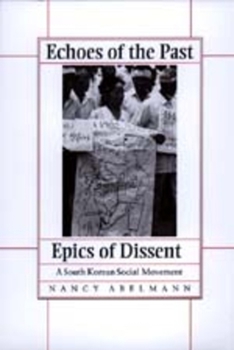Echoes of the Past, Epics of Dissent: A South Korean Social Movement
Select Format
Select Condition 
Book Overview
Echoes of the Past, Epics of Dissent, the story of a South Korean social movement, offers a window to a decade of tumultuous social protest in a postcolonial, divided nation. Abelmann brings a dramatic chapter of modern Korean history to life-a period in which farmers, student activists, and organizers joined to protest the corporate ownership of tenant plots never distributed in the 1949 Land Reform.
From public sites of protest to backstage meetings and negotiations, from farming villages to university campuses, Abelmann's highly original study explores this movement as a complex process always in the making. Her discussion moves fluently between past and present, local and national, elites and dominated, and urban and rural. Touching on major historical issues, this ethnography of dissent explores contemporary popular nationalism and historical consciousness.
From public sites of protest to backstage meetings and negotiations, from farming villages to university campuses, Abelmann's highly original study explores this movement as a complex process always in the making. Her discussion moves fluently between past and present, local and national, elites and dominated, and urban and rural. Touching on major historical issues, this ethnography of dissent explores contemporary popular nationalism and historical consciousness.
Format:Paperback
Language:English
ISBN:0520204182
ISBN13:9780520204188
Release Date:November 1996
Publisher:University of California Press
Length:467 Pages
Weight:1.00 lbs.
Dimensions:0.9" x 6.3" x 9.0"
Customer Reviews
1 rating
A first-rate ethnography of the 1980s Korean society
Published by Thriftbooks.com User , 20 years ago
There are not many good history or ethnograpy books about the Korean society of the 1980s except for some impressionistic or too journalistic writings, even though the period is very important in terms of the political, social, cultural and intellectual transformation of contemporary South Korea. In this sense, this book by Nancy Abelmann is superb. This book focuses on tenant farmers' movement in 1987, both in a Southwestern village of Korea and in Seoul. In this process, the author not only deals with farmers' movement, but also examines the issues of class, nation, capitalism and democracy in the context of modern Korean history. Especially, the wholeness of social movement in Korea is revealed, when the author finds some links between 'minjung'(people, mass) like farmers on the one hand and student activists on the other. In this way, this book may become one of the rare books revealing some clear pictures of progressive Korean student movement during the 1980s, which was decisive in the process of 1987 democratization movement and later changes in South Korea. And this book is also theoretically insightful and sound in terms of relating both a history writing and politics as inseparable discursive constructions, while showing the importance of [class] positioning in narrating history. Thus, the author compares both narratives given by capitalists who hire tenent farmenrs on the one side and by farmers and minjung activists on the other. Compared with other books about Korea of the same period, this book includes more enormous details with a focus on farmers' movement in the 1980s. And the author's concious self-positioning among other subject figures in this work appears to be one of interesting characteristics here. It can be said that this work, with a book about Korean Workers by Hagen Koo, is a must-read for understanding the transformation of 'social mentalities' in today's Korean society, which had a watershed in the 1980s and still going on in different forms in the current post-radical social context since the early 1990s.





